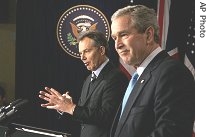2006年VOA标准英语-Bush and Blair Meeting Dominated by Iraq Report(在线收听)
By Deborah Block
Washington, DC
08 December 2006
watch Bush Blair Iraq report
 |
| President Bush, right, and British Prime Minister Tony Blair take part in a joint press availability, Thursday, 7 Dec. 2006, in the Eisenhower Executive Office Building in Washington |
U.S. President George W. Bush and Britain's Prime Minister Tony Blair met at the White House Thursday -- one day after a report by the U.S. bipartisan Iraq Study Group said American policy in Iraq is not working, and called for a change of strategy. During a joint news conference with the British leader, President Bush said although the report has good ideas on how to go forward, it is only one of several recommendations he will consider.
The report issued by the Iraq Study Group describes the situation in Iraq as "grave and deteriorating." At a news conference, President Bush called the violence unsettling, and said "it's bad in Iraq." He said progress in Iraq had not occurred as fast as he had hoped, and he thought U.S.-led forces would succeed quicker in stopping the fighting, which he blamed on extremists both inside and outside the country.
"And it is true that Sunni and Shia extremists are targeting each other's innocent civilians and engaging in brutal reprisals. It is also true that forces beyond Iraq's borders contribute to this violence and the prime minister [of Iraq, Nouri al-Maliki ] put it this way: He said the violence is not an accident or a result of faulty planning. It is a deliberate strategy. It is the direct result of outside extremists teaming up with internal extremists -- al-Qaida with the Sunni insurgents and Iran with Shia militia, to foment hatred and to throttle at birth the possibility of a non sectarian democracy."
The ten-member Iraq Study Group recommends the U.S. military change its main mission from combat to support, and suggests pulling out most American troops by early 2008. Before announcing any decisions, Mr. Bush said he is also considering recommendations from the U.S. Defense and State Departments.
He went on to say that any resolution on the Iraq conflict is tied to reducing tensions between Israel and the Palestinians, as well as other parts of the Middle East.
Prime Minister Blair is to travel to the Middle East soon to meet with Israeli and Palestinian leaders. He agreed with Mr. Bush on the importance of reducing tensions in the Middle East, and said the consequences are severe if the government of Iraqi Prime Minister Nouri al-Maliki fails. “All of us who are engaged in this, but particularly those in the region, live up to their responsibilities in supporting the Maliki government in ensuring that Iraq is able to proceed in a democratic and non-sectarian way. And I think that finally, as you rightly emphasize, it is important that we do everything that we can in the wider Middle East to bring about peace between Israel and the Palestinians."
The Iraq Study Group is recommending the U.S. engage with Iraq's neighbors, Syria and Iran. But Mr. Bush reiterated his view that Tehran must first suspend uranium enrichment, and both Syria and Iran must show they are serious about wanting to improve the security situation in Iraq.
"If people come to the table to discuss Iraq, they must come understanding their responsibilities to not fund terrorists, to help this young democracy survive, to help with the economics of the country. And if people are not committed, if Syria and Iran are not committed to that concept, then they shouldn't bother to show up."
On Thursday, the co-chairmen of the Iraq Study Group met with the U.S. Senate Armed Services Committee to discuss the report. Although many in Congress have praised the report, some are skeptical of two of its recommendations - accelerating the U.S. military's work to train Iraqi forces, and a diplomatic approach to Syria and Iran.
Former secretary of state, Republican James Baker, says it is unlikely Iran would help the United States succeed in Iraq. "If we ask Iran to come and they say no, we and the Iraqi government, and they say no, then we will hold them up to public scrutiny as the rejectionist state that they have proven to be. Now, we're not naive enough to think that they - in this case they may want to help - they probably don't. The president authorized me to approach the Iranian government. I did so. And they, in effect, said 'We would not be inclined to help you this time around.' Fine. What do we lose by saying 'We're getting all of Iraq's neighbors together, we want you to come,' and if they say no, we show the world what they're all about."
Mr. Baker says, despite partisan differences over how to end U.S. involvement in Iraq, the Bush administration and Congress must work together to forge a new course of action.